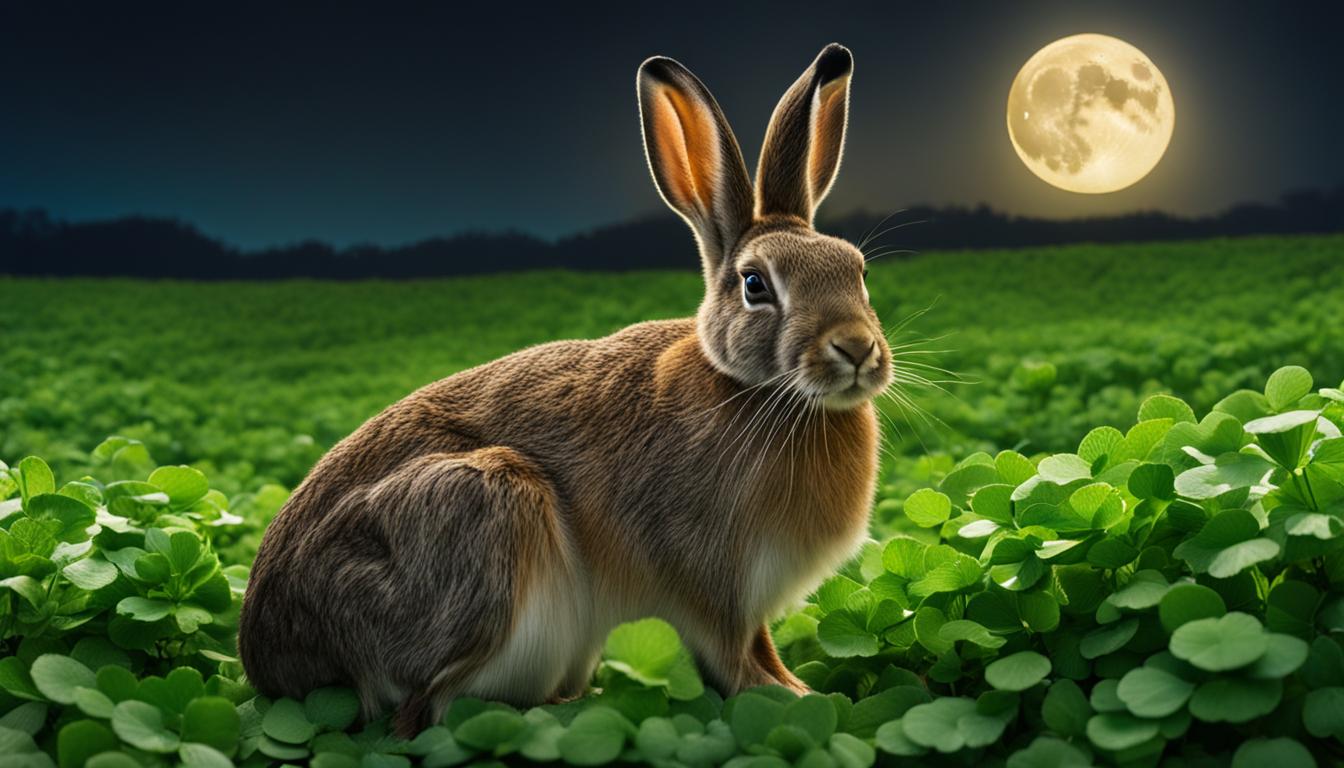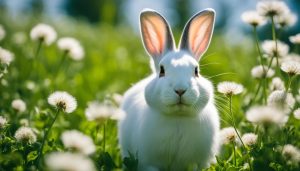Welcome to our exploration of the fascinating world of hares and their symbolic connections to luck and good fortune. Throughout history, hares and rabbits have held esteemed positions in various cultures, captivating the imagination and inspiring countless myths and beliefs. Today, we delve into the diverse tapestry of cultural associations, shedding light on the question of whether hares are truly a sign of good luck.
Contents
Key Takeaways:
- Hares and rabbits have long been associated with luck and positive omens in various cultures.
- They hold a special connection to the moon in many mythologies, symbolizing fertility and good fortune.
- Goddesses in different mythologies have close ties to hares, further enhancing their symbolism of good luck and positive energy.
- Hares also have a complex relationship with witchcraft and superstitions, often being associated with witches and occult practices.
- They are depicted as tricksters in folklore, highlighting their mischievous nature.
Hares and the Moon: A Lunar Connection
Hares and rabbits have long been associated with the moon in various cultures and mythologies. One of the most well-known connections is the moon-gazing hare, a symbol of good fortune in Pagan beliefs. Spotting a moon-gazing hare is believed to bring impending luck and positive omens. This association highlights the special relationship between hares and the moon, emphasizing their role as bringers of good luck.
In Chinese mythology, the connection between hares and the moon takes a different form. Female hares are believed to conceive by bathing in the glow of a full moon, further associating them with fertility and lunar energy. Additionally, Asian folklore depicts the moon rabbit, a creature that resides on the moon and is revered for its benevolent nature. These lunar associations contribute to the belief in hares as lucky and auspicious creatures.
“The moon-gazing hare, with its elegant and mystifying presence, represents the awe-inspiring beauty and power of the moon. Its association with good luck and positive omens adds to the allure and fascination surrounding hares.”
The connection between hares and the moon not only adds to their symbolism but also underscores their cultural significance. From Pagan beliefs to Chinese mythology, hares are seen as creatures with a close affinity to the lunar realm. Whether it’s the moon-gazing hare or the moon rabbit, these lunar connections contribute to the widespread belief in hares as bearers of good luck and positive energy.
Hares and the Moon: Symbolic Significance
The symbolism of hares and the moon extends beyond luck and good fortune. Just as the moon goes through different phases, hares are often associated with transformation and change. Their ability to adapt to different environments and their energetic behavior under the moonlight make them powerful symbols of growth, flexibility, and rebirth.
| Lunar Association | Symbolic Significance |
|---|---|
| Moon-Gazing Hare | Good luck and positive omens |
| Moon Rabbit | Harmony, benevolence, and fertility |
| Hares and the Moon | Transformation, adaptability, and growth |
As we explore the myths and beliefs surrounding hares, it becomes clear that their connection to the moon is not merely coincidental. It is a sacred bond that transcends cultures and holds deep symbolic significance. Whether you view hares as lucky charms or symbols of transformation, their association with the moon continues to captivate and inspire.
Hares as Companions of Goddesses
Hares have long been associated with goddesses in different mythologies. In Celtic mythology, hares are considered sacred creatures that have direct access to the Otherworld. They are closely linked to the goddess Brigid, who is associated with fertility, healing, and poetry. The connection between hares and goddesses extends beyond Celtic mythology. In other cultures, goddesses like the Mayan moon goddess Po and the Chinese lunar deity Chang’e are often depicted with rabbits or hares. These associations further enhance the belief in hares as symbols of good luck and positive energy.
Brigid, the Celtic goddess, holds a special place for hares. She is known as the patroness of healers, poets, and artisans. In Celtic folklore, it is believed that hares are sacred to Brigid and carry her power and blessings. Hares were considered messengers of the divine, carrying messages between the mortal world and the realm of the gods.
The association between hares and goddesses speaks to the significance of hares in ancient cultures. As companions to powerful female deities, hares embody qualities of fertility, abundance, and protection. Their presence in mythology and folklore reflects the reverence and awe that people have had for these magical creatures throughout history.
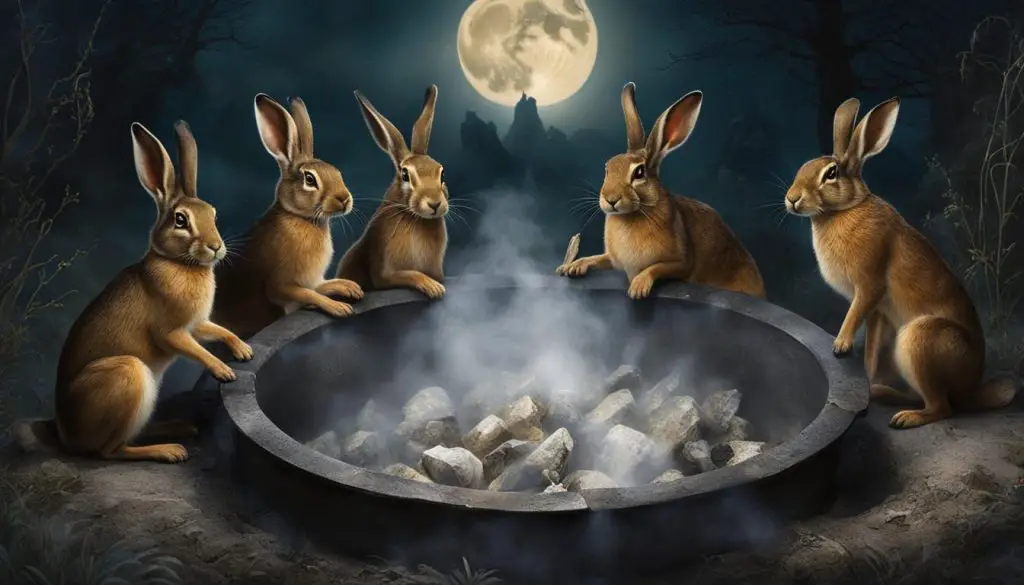
| Witchcraft and Hares | Hare Superstitions |
|---|---|
| In European folklore, hares were believed to be the preferred familiars of witches. | Encountering a hare is often considered a sign of bad luck. |
| Hares were thought to aid witches in their magical practices. | The superstition mirrors the belief about black cats crossing one’s path. |
| Legends depict witches shapeshifting into hares for stealth and mischief. | The presence of a hare is associated with unfortunate outcomes and misfortune. |
These connections between hares and witchcraft contribute to the darker side of their symbolism, showcasing their association with the occult and the unknown. Despite their negative connotations, these superstitions and legends continue to captivate our imagination and curiosity, unveiling the enduring fascination with hares and their mysterious role in folklore.
Trickery and Deception: The Tales of Hares
Hares and rabbits have long been depicted as mischievous creatures in folklore, often associated with trickery and deception. One such tale is that of the Irish Fairy Rabbit, a legendary creature believed to have the power to lure unsuspecting individuals into being drowned at sea. This eerie and captivating story highlights the darker side of hare symbolism and the potential for danger hidden beneath their seemingly innocent exterior.
Another famous tale involving hares is the story of Mary Toft, who managed to deceive doctors in 18th-century England into believing that she had given birth to a litter of rabbits. This extraordinary tale of deception and imagination showcases the mysterious and enigmatic nature of hares, leaving us questioning the boundaries between reality and illusion.
“The Irish Fairy Rabbit was believed to lure people into being drowned at sea.”
These rabbit tales serve as a reminder that not everything is as it seems. Hares and rabbits, with their swift movements and elusive behaviors, embody the essence of trickery and cunning. Their ability to confound and surprise has captured the imaginations of people throughout history, making them enduring characters in folklore and mythology.
| Tale | Summary |
|---|---|
| The Irish Fairy Rabbit | A legendary creature capable of leading people to their demise at sea. |
| Mary Toft and the Bury of Rabbits | A woman who convinced doctors that she gave birth to rabbits, showcasing the power of deception. |
The tales of hares remind us of the complexity and wonder of the natural world. They serve as cautionary tales, urging us to question appearances and embrace the unexpected. While hares may be known for their trickery, they also evoke a sense of curiosity and fascination that continues to captivate our imaginations.
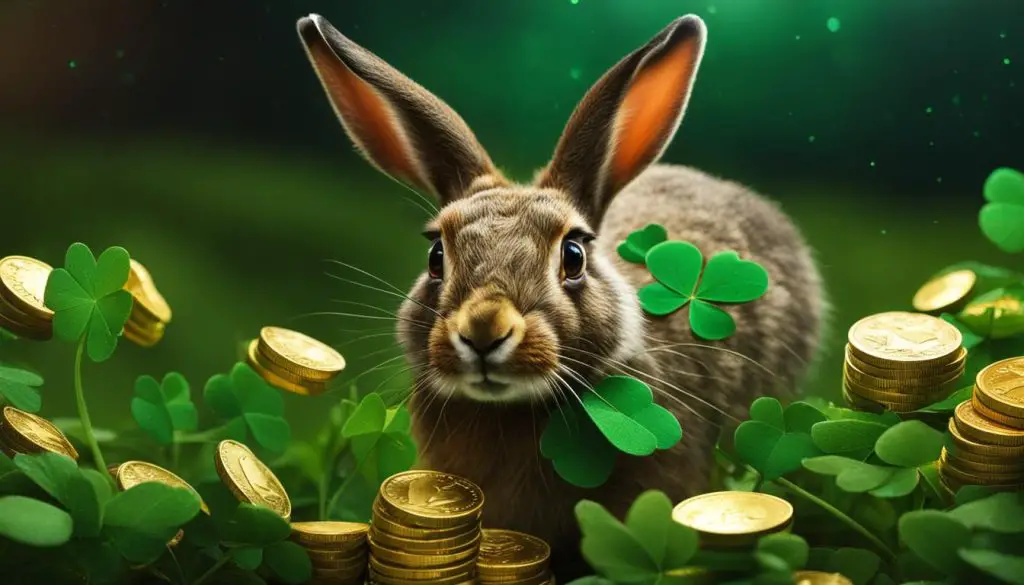
The Science of Luck and Rabbit Sightings
Belief in luck has been a fascinating topic of study in the field of psychology. While luck itself is intangible, research has shown that our belief in luck can significantly impact our behavior and mindset. People who have a strong belief in luck tend to be more proactive and optimistic in pursuing their goals, as they perceive opportunities and positive outcomes more readily.
When it comes to rabbit sightings, although it may not directly change one’s fate, the act of encountering a rabbit can still have a profound psychological effect. This unexpected encounter can bring a sense of joy and wonder, creating a momentary boost in happiness and optimism. The sight of a rabbit can serve as a reminder to embrace positivity and hope, especially in challenging or uncertain times.
“Believing in luck can actually improve your luck because it changes your mindset,” explains Dr. Jane Williams, a leading expert in positive psychology. “When you believe in luck, you are more likely to notice opportunities and take proactive steps towards achieving your goals.”
It’s important to note that the significance of rabbit sightings and luck may vary from person to person. For some, it may be a simple reminder of the beauty of nature or a pleasant coincidence. For others, it may carry a deeper symbolic meaning tied to personal beliefs or cultural associations. Regardless, the experience of spotting a rabbit can provide a small moment of delight and inspiration, contributing to a more positive outlook on life.
| Benefits of Belief in Luck | Effect on Behavior |
|---|---|
| Increased optimism and positivity | Proactive pursuit of goals |
| Enhanced resilience and perseverance | Greater openness to new opportunities |
| Elevated mood and sense of well-being | Improved problem-solving skills |
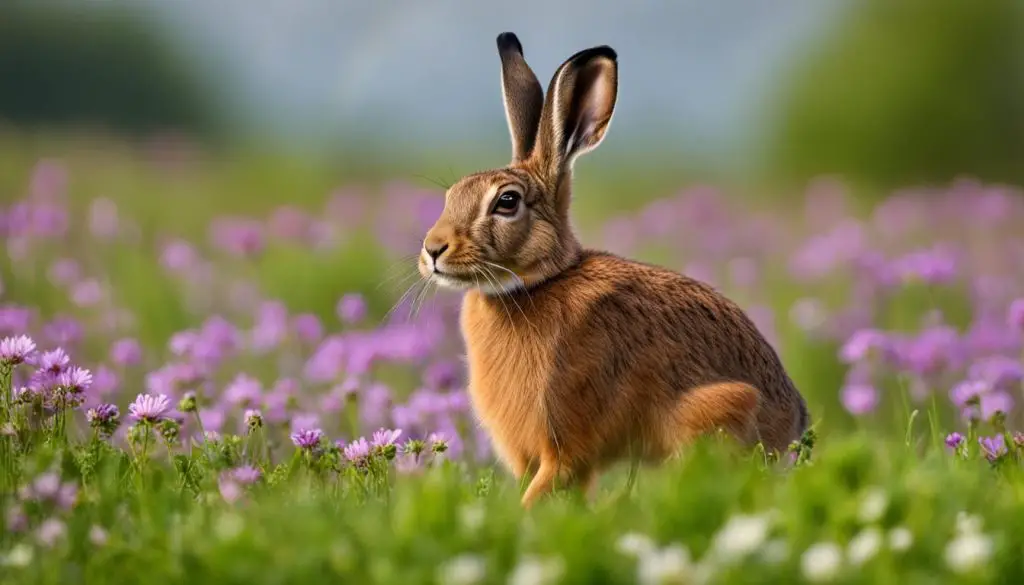
While the science of luck and rabbit sightings may not provide concrete answers to the question of whether hares are a sign of good luck, it offers valuable insights into the power of belief and perception. Whether you attribute luck to a rabbit sighting or simply appreciate the wonder of encountering these creatures, the experience can bring a touch of magic and optimism to your day.
Conclusion
In conclusion, hares and rabbits have long been associated with luck and good fortune in various cultures and folklore. Their connections to the moon, goddesses, witchcraft, and trickery contribute to their symbolism as bringers of positive omens. While it may be difficult to definitively answer whether hares are a sign of good luck, their presence can still inspire feelings of joy, wonder, and hope.
Whether it is the belief in luck or personal experiences, the symbolism of hares continues to captivate and intrigue people around the world. The diverse myths, legends, and superstitions surrounding hares highlight the enduring fascination with these creatures and their association with positive energy.
Ultimately, spotting a hare or rabbit may not directly change one’s fate, but the optimism and positivity it inspires can influence one’s mindset. The act of encountering a rabbit can bring a sense of joy and remind us to embrace hope, regardless of its tangible effects on luck. So, keep your eyes open and appreciate the enchanting presence of these mystical creatures in our world.
FAQ
Are hares considered to be lucky animals?
Hares hold symbolic connections to luck and good fortune in various cultures and folklore.
What is the connection between hares and the moon?
Hares are often associated with the moon and its mystical properties, such as in the moon-gazing hare and moon rabbit myths.
Are hares associated with goddesses?
Yes, hares are often linked to goddesses in different mythologies, such as the Celtic goddess Brigid and the Mayan moon goddess Po.
What is the relationship between hares and witchcraft?
Hares have ties to witchcraft and are believed to be the preferred familiars of witches in European folklore.
Are hares portrayed as tricksters in folklore?
Yes, hares are often depicted as tricksters in tales such as the Irish Fairy Rabbit, known for luring people into danger.
Can seeing a rabbit bring good luck?
While the concept of luck is subjective, seeing a rabbit can inspire feelings of joy, wonder, and hope, which can positively influence one’s mindset.

